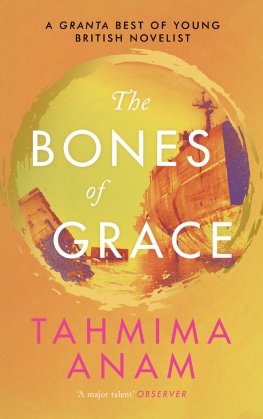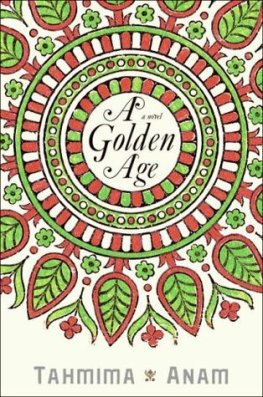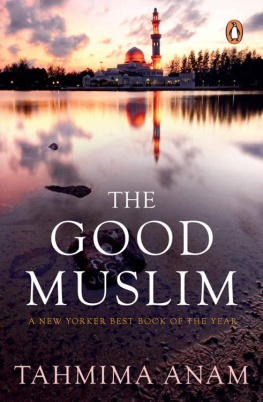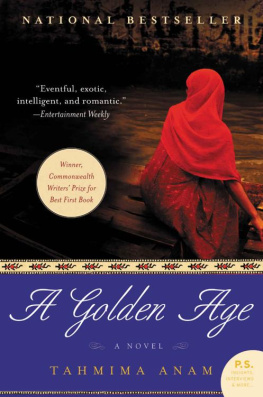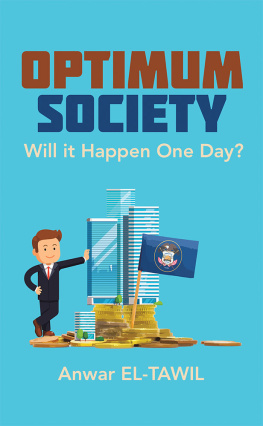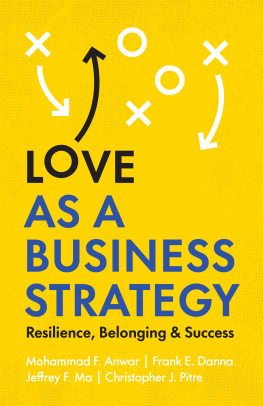Tahmima Anam
The Bones of Grace
For Roland Lamb, again (and always)
And for my sister Shaveena, who, though she arrived late, saved me from the loneliness of one
Without really knowing, we divine; our life has a sister ship, following quite another route. While the sun blazes behind the islands.
The Blue House, Thomas Transtrmer
I saw you today, Elijah. You were crossing the road. There is a building on the corner of Mass Ave and Harvard Street that looks like a miniature version of the Flatiron Building in New York. You had your back to the building, and when the little white man began to blink, you stepped off the sidewalk and onto the street thats when I saw you. You made a little gesture with your hand that made me think you had seen me too, that you were waving, but it was a small motion of your wrist that meant nothing you were just bruising the cold November air, and before you caught my eye, I bolted.
I knew it would only be a matter of time before we ran into each other. Cambridge is a small town and the orbits are modest. Ive been back three months, and every day Ive swept the corners of my vision, hoping and not hoping, as the warm days turned to ice, that it might be you in that charcoal coat, your legs in that pair of loose-fitting trousers. Your voice ordering the coffee before mine.
Diana has brought me back. She is here or, at least, a very small part of her is here in my hand. Her ankle bone is paler and lighter than I had imagined time has robbed it of its weight but her presence is nothing short of a miracle, here in this lab, in this town where my dreaming of her and my dreaming of you began. When we left her behind in Dera Bugti, I never thought I would see her again. I thought the mystery of the walking whale would remain in the ground forever, one of the secrets we were never meant to unearth. But earlier this year I received a message, written in Urdu and translated, reluctantly, by my mother:
Dear Miss Zubaida Haque,
Here is a gift from our departed friend. I do not understand why a man would give his life for such a thing, but perhaps you will. He got a letter out, asking me to recover his treasure and send it to you.
I have no choice but to dispatch my duty to a brother and comrade. We scoured the desert for your Diana, and now I am sending her to you, piece by piece. I do not know what these bones mean, but if you are reading this, you will know that our friend had a parting wish, and that I have endeavoured to fulfil it.
I didnt want to believe the message was real after years of silence, could it be that Zamzam was helping to finish what we had started? But there was no other explanation, no other possible reason for this strangers message, and he had used her name, Diana. I replied, listing the departments details, offering assistance to cover the transportation costs, the formalities that would have to be completed in order for ancient fossils to cross borders. Then I boarded a plane, I came here, and I waited.
When the box arrived, it was wrapped in several layers of duct tape, and inside, within folds of newspaper, encased in a layer of red matrix, was Dianas double-hinged ankle. I closed my fingers around the padding and felt the sting of tears in my eyes. I knew immediately that this wasnt just the fulfilment of a dream I have so long desired yet had taught myself to renounce; it was also a way for me to make a final plea for you. Diana is the reason I left this town, and Diana is why I have returned. I think of her as a spirit of comings and goings, a beacon that leads me across continents and through time. I live in hope that she will lead me back to you.
I suppose I must have been composing this story in my head for some time, but as I held Dianas bone in my hand that day, a flood of words came to my mind, and I rushed home and wrote them down. I have been living in a state of waiting, Elijah, for this moment, this opportunity for reckoning, and Zamzam, from beyond his grave, has granted me my wish. Diana is here, and I have seen you, and now I can take account of the whole thing not just of you, the great love of my life, and not just of Ambulocetus, but also of Anwar, the man who led me to my mother, and of Grace, the ship that was ground to dust before our eyes. There is a whale, a woman who gave up her child, a piano, and a man who searched so long and hard for his beloved that he found me. But you have interrupted me too soon. I am not finished yet, and until I do there will be no way for us to wend our way back together.
You were ahead of yourself, Elijah, standing in that intersection before you were meant to.
The first words I ever said to you were: When I was nine years old, I found out I was adopted. And you replied: Aristotle was an orphan. And I said: So was the Prophet Muhammad. That evening, the music and the heat of late summer had made me recall the day my parents had finally confessed the thing that I had, even as a small child, always suspected. I remembered that after my ninth birthday party, when the guests had gone home and what remained was the smell of fried chicken and torn corners of wrapping paper and the scatter of fallen potato chips, my parents told me that they had adopted me two years after they had married and fifteen years after the war. I hardly ever thought about that day, but, on the evening we met, I recalled it clearly: my father had built a piata that had emptied its candy onto the lawn, and a boy from my school had taken the piata stick and chased the other boys into a shady corner of the garden where the cobwebs were as thick as books. I remembered being sandwiched between my parents as they narrated the story, remembered each holding one of my hands and telling me about wanting so much for a baby and the miracle of finding me, remembered that I developed the sudden urge to vomit, that my vomit was candy-orange, and remembered especially the colour, because in those days there was no flush in the evening and Id had to pour six mugfuls of water from the bucket into the commode to make it go away. It came back to me in a flood on that hot night in Cambridge that sat heavy on all of our shoulders, late summer and the semester about to begin, the campus sparse. I was preoccupied with the final preparations for my trip to find a complete skeleton of the ancient whale Ambulocetus natans, and my memories mingled with thoughts of packing away my apartment and the journey I was about to embark on, imagining the dig, the moment of discovery, the possible unveiling of a fossil that had already changed the way we looked at the relationship between the land and the sea, and in this interlude, between the memory and the anticipation, a crack appeared, a pause in which everything slowed down, an in-between moment that was neither here nor there and into that crack fell you: a man with piano hands and the smell of cold weather on his collar.
I had gone, as you of course know, to a concert at Sanders Theatre. I sometimes spent evenings in that wood-panelled auditorium, and on that night, on the eve of my departure, I allowed myself this indulgence as a coda to my seven years in America, immersing myself, as I was often wont to do, in sounds that would always resonate, despite, or perhaps because of, their unfamiliarity. I usually forgot the music, except once, when Yo-Yo Ma played the Bach Cello Suites. The event was more of an interview than a concert so he only played for a few minutes at the end, but it was brief and magical, and the only time I had wished to share the experience with someone else.
So it was my last night, and my last concert. I found, when I arrived, that it would be the Shostakovich Preludes. I had heard of Shostakovich, but other than the name I didnt know anything about the music. I saw a grand piano on stage, then the lights went down and I was surprised when a slight woman emerged from behind the curtain. She was older, possibly in her sixties, and she wore a long skirt and had her hair tied into a grey knot that hung low on her neck. She began to play short pieces of perhaps five minutes each. I found the music pleasant but unexciting. It would begin on a romantic note, but somewhere in the middle it would become distant, almost intellectual. I couldnt connect. At one point I became aware of a man to my left: of you, Elijah, of the way you tapped your hand against your knee, the frayed material of your jeans where your fingers rested, your sandalled feet and the canvas bag that sat under your chair.

